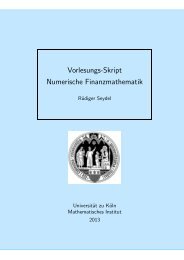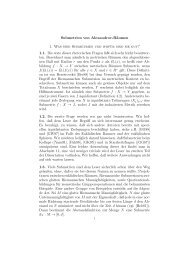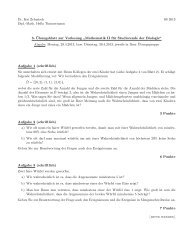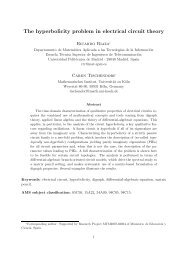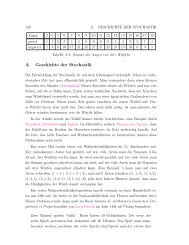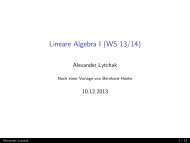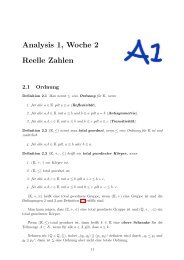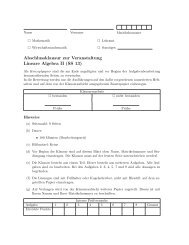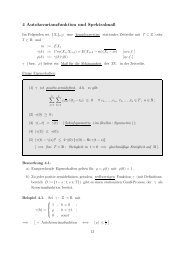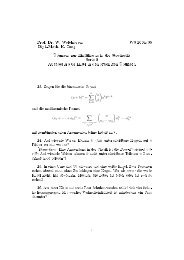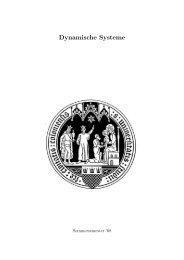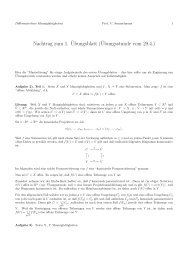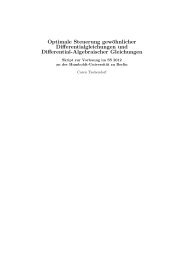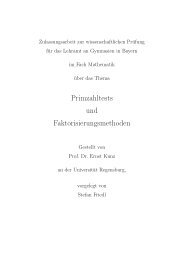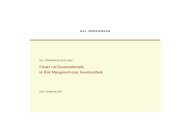- Page 1 and 2:
Inhaltsverzeichnis DMV Tagung 2011
- Page 3 and 4:
DMV Tagung 2011 - Köln, 19. - 22.
- Page 5 and 6:
DMV Tagung 2011 - Köln, 19. - 22.
- Page 7 and 8:
Ken Ono Emroy University, Atlanta A
- Page 9 and 10:
DMV Tagung 2011 - Köln, 19. - 22.
- Page 11 and 12:
DMV Tagung 2011 - Köln, 19. - 22.
- Page 13 and 14:
DMV Tagung 2011 - Köln, 19. - 22.
- Page 15 and 16:
Markus Linckelmann University of Ab
- Page 17 and 18:
DMV Tagung 2011 - Köln, 19. - 22.
- Page 19 and 20:
Sektion 2 DMV Tagung 2011 - Köln,
- Page 21 and 22:
DMV Tagung 2011 - Köln, 19. - 22.
- Page 23 and 24:
Frank Kutzschebauch Universität Be
- Page 25 and 26:
DMV Tagung 2011 - Köln, 19. - 22.
- Page 27 and 28:
Sektion 3 Arithmetische Geometrie u
- Page 29 and 30:
DMV Tagung 2011 - Köln, 19. - 22.
- Page 31 and 32:
Ulrich Derenthal Ludwig-Maximilians
- Page 33 and 34:
DMV Tagung 2011 - Köln, 19. - 22.
- Page 35 and 36:
DMV Tagung 2011 - Köln, 19. - 22.
- Page 37 and 38:
Myriam-Sonja Hantke Universität zu
- Page 39 and 40:
Sektion 5 Differentialgleichungen D
- Page 41 and 42:
DMV Tagung 2011 - Köln, 19. - 22.
- Page 43 and 44:
DMV Tagung 2011 - Köln, 19. - 22.
- Page 45 and 46:
DMV Tagung 2011 - Köln, 19. - 22.
- Page 47 and 48:
Anna Dall’Acqua Otto-von-Guericke
- Page 49 and 50:
André Fischer Center of Smart Inte
- Page 51 and 52:
Juliette Hell Freie Universität Be
- Page 53 and 54:
DMV Tagung 2011 - Köln, 19. - 22.
- Page 55 and 56:
DMV Tagung 2011 - Köln, 19. - 22.
- Page 57 and 58:
DMV Tagung 2011 - Köln, 19. - 22.
- Page 59 and 60:
DMV Tagung 2011 - Köln, 19. - 22.
- Page 61 and 62:
Felix Schulze Freie Universität Be
- Page 63 and 64:
Eleutherius Symeonidis Katholische
- Page 65 and 66:
DMV Tagung 2011 - Köln, 19. - 22.
- Page 67 and 68:
DMV Tagung 2011 - Köln, 19. - 22.
- Page 69 and 70:
DMV Tagung 2011 - Köln, 19. - 22.
- Page 71 and 72:
DMV Tagung 2011 - Köln, 19. - 22.
- Page 73 and 74:
DMV Tagung 2011 - Köln, 19. - 22.
- Page 75 and 76:
DMV Tagung 2011 - Köln, 19. - 22.
- Page 77 and 78:
Sektion 8 Numerik DMV Tagung 2011 -
- Page 79 and 80:
DMV Tagung 2011 - Köln, 19. - 22.
- Page 81 and 82:
DMV Tagung 2011 - Köln, 19. - 22.
- Page 83 and 84:
DMV Tagung 2011 - Köln, 19. - 22.
- Page 85 and 86:
DMV Tagung 2011 - Köln, 19. - 22.
- Page 87 and 88:
DMV Tagung 2011 - Köln, 19. - 22.
- Page 89 and 90:
DMV Tagung 2011 - Köln, 19. - 22.
- Page 91 and 92:
Sektion 10 Geometrie und Topologie
- Page 93 and 94:
DMV Tagung 2011 - Köln, 19. - 22.
- Page 95 and 96:
DMV Tagung 2011 - Köln, 19. - 22.
- Page 97 and 98:
Felix Schlenk Universität Neuchât
- Page 99 and 100:
DMV Tagung 2011 - Köln, 19. - 22.
- Page 101 and 102:
DMV Tagung 2011 - Köln, 19. - 22.
- Page 103 and 104:
DMV Tagung 2011 - Köln, 19. - 22.
- Page 105 and 106:
Minisymposium 2 DMV Tagung 2011 - K
- Page 107 and 108:
DMV Tagung 2011 - Köln, 19. - 22.
- Page 109 and 110:
Markus Richter Karlsruher Institut
- Page 111 and 112:
DMV Tagung 2011 - Köln, 19. - 22.
- Page 113 and 114:
DMV Tagung 2011 - Köln, 19. - 22.
- Page 115 and 116:
DMV Tagung 2011 - Köln, 19. - 22.
- Page 117 and 118:
DMV Tagung 2011 - Köln, 19. - 22.
- Page 119 and 120:
Minisymposium 4 DMV Tagung 2011 - K
- Page 121 and 122:
DMV Tagung 2011 - Köln, 19. - 22.
- Page 123 and 124:
Edgar Brunner Universität Götting
- Page 125 and 126:
DMV Tagung 2011 - Köln, 19. - 22.
- Page 127 and 128:
DMV Tagung 2011 - Köln, 19. - 22.
- Page 129 and 130:
DMV Tagung 2011 - Köln, 19. - 22.
- Page 131 and 132:
Minisymposium 5 Darstellungstheorie
- Page 133 and 134: DMV Tagung 2011 - Köln, 19. - 22.
- Page 135 and 136: DMV Tagung 2011 - Köln, 19. - 22.
- Page 137 and 138: DMV Tagung 2011 - Köln, 19. - 22.
- Page 139 and 140: DMV Tagung 2011 - Köln, 19. - 22.
- Page 141 and 142: DMV Tagung 2011 - Köln, 19. - 22.
- Page 143 and 144: Jonathan Spreer Universität Stuttg
- Page 145 and 146: DMV Tagung 2011 - Köln, 19. - 22.
- Page 147 and 148: DMV Tagung 2011 - Köln, 19. - 22.
- Page 149 and 150: DMV Tagung 2011 - Köln, 19. - 22.
- Page 151 and 152: DMV Tagung 2011 - Köln, 19. - 22.
- Page 153 and 154: DMV Tagung 2011 - Köln, 19. - 22.
- Page 155 and 156: Christian Gerhards TU Kaiserslauter
- Page 157 and 158: DMV Tagung 2011 - Köln, 19. - 22.
- Page 159 and 160: DMV Tagung 2011 - Köln, 19. - 22.
- Page 161 and 162: DMV Tagung 2011 - Köln, 19. - 22.
- Page 163 and 164: DMV Tagung 2011 - Köln, 19. - 22.
- Page 165 and 166: DMV Tagung 2011 - Köln, 19. - 22.
- Page 167 and 168: DMV Tagung 2011 - Köln, 19. - 22.
- Page 169 and 170: DMV Tagung 2011 - Köln, 19. - 22.
- Page 171 and 172: DMV Tagung 2011 - Köln, 19. - 22.
- Page 173 and 174: DMV Tagung 2011 - Köln, 19. - 22.
- Page 175 and 176: DMV Tagung 2011 - Köln, 19. - 22.
- Page 177 and 178: Minisymposium 12 Numerische Finanzm
- Page 179 and 180: DMV Tagung 2011 - Köln, 19. - 22.
- Page 181 and 182: Minisymposium 13 Operatortheorie DM
- Page 183: DMV Tagung 2011 - Köln, 19. - 22.
- Page 187 and 188: DMV Tagung 2011 - Köln, 19. - 22.
- Page 189 and 190: DMV Tagung 2011 - Köln, 19. - 22.
- Page 191 and 192: Minisymposium 14 DMV Tagung 2011 -
- Page 193 and 194: DMV Tagung 2011 - Köln, 19. - 22.
- Page 195 and 196: DMV Tagung 2011 - Köln, 19. - 22.
- Page 197 and 198: Minisymposium 15 Übergang Schule -
- Page 199 and 200: DMV Tagung 2011 - Köln, 19. - 22.
- Page 201 and 202: DMV Tagung 2011 - Köln, 19. - 22.
- Page 203 and 204: DMV Tagung 2011 - Köln, 19. - 22.
- Page 205 and 206: DMV Tagung 2011 - Köln, 19. - 22.
- Page 207 and 208: DMV Tagung 2011 - Köln, 19. - 22.
- Page 209 and 210: DMV Tagung 2011 - Köln, 19. - 22.
- Page 211 and 212: DMV Tagung 2011 - Köln, 19. - 22.
- Page 213 and 214: DMV Tagung 2011 - Köln, 19. - 22.
- Page 215 and 216: Autorenverzeichnis Abels, Helmut, 1
- Page 217 and 218: Martino, Maurizio, 15 Maruhn, Jan H



